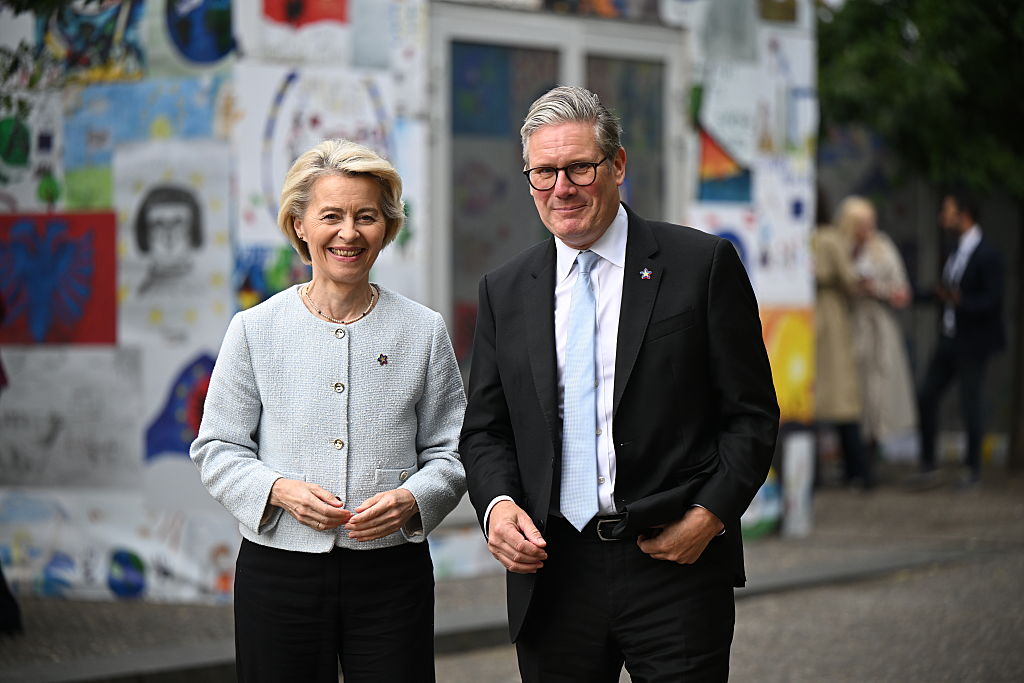LONDON – The EU and UK will solidify a ‘reset’ in their tumultuous post-Brexit relationship at a summit in London on Monday, with a security pact and the contours of future deals on food and travel set to be unveiled.
The EU’s triumvirate of leaders – European Commission President Ursula von der Leyen, European Council President António Costa, and top diplomat Kaja Kallas – will all attend the gathering at Lancaster House, a 19th-century mansion often used in film as a stand-in for Buckingham Palace.
The setting is suitably grandiose for a summit where symbolism appears paramount. Having met British Prime Minister Keir Starmer in Albania on Friday, von der Leyen said the package to be unveiled “can mark the start of a new chapter in our relationship,” marred by mistrust for almost a decade under Starmer’s predecessors.
The summit is expected to produce three texts: a defence and security partnership, a “geopolitical” statement critical of US isolationism under President Donald Trump, and a declaration outlining the scope of future trade talks.
EU ambassadors met on Sunday afternoon to review eleventh-hour changes to the texts, and were due to convene again on Monday morning. One EU diplomat recalled a deacde-old Brexit adage: “nothing is agreed until everything is agreed.”
Over the weekend, the prime minister’s office told UK media that the Commission could agree to lift its ban on British passport holders using e-gates when entering the EU, potentially reducing lengthy queues in a boon for holidaymakers.
No alarms and no surprises
Otherwise, the “broad shape of summit outcomes” has been clear since February, said David Henig, a former British trade negotiator and current director at the European Centre for International Political Economy.
Negotiators have indulged in some “last-minute haggling to balance the deal to various constituencies” who may be more sceptical, “particularly in the EU,” Henig added. EU governments and British MPs would have to approve some parts of the deal before they took effect.
Kallas would be the EU signatory to a security partnership, the first step towards UK firms accessing the EU’s upcoming €150 billion defence loan scheme.
The fears of coastal EU countries, who had sought to tie such a partnership to a multi-year rollover of existing fishing quotas in UK waters, appear to have been assuaged. Kallas told the BBC last week: “I think we’re over the fish.”
The two sides have also discussed linking their carbon emissions trading schemes and agreeing a youth mobility deal – but little more than an ‘agreement to agree’ on future changes to the trading relationship will likely emerge on Monday.
European and British farmers will closely analyse any announcement of progress towards slashing border checks on agrifood products, facilitated by the UK accepting so-called dynamic alignment with EU sanitary and phytosanitary (SPS) rules – meaning that as EU rules change, the UK updates its own rules accordingly.
EU governments have reportedly disagreed in recent weeks over whether such a deal should be time-limited, like that on fishing rights, or indefinite.
If signed, an SPS deal would drastically reduce checks between Great Britain and Northern Ireland – which were eased with the 2023 Windsor Framework but remain fiercely opposed by unionists in Northern Ireland, who decry what they describe as a border in the Irish Sea.
Any such move will likely receive a “very cautious” welcome from unionists, said Professor David Phinnemore of Queen’s University Belfast, whose polling last week found that 74% of “strong unionists” oppose closer UK-EU ties, while 66% of “slightly unionist” voters are in favour.
“The Windsor Framework was oversold and so unionists will want to see the evidence of change before endorsing what the UK and the EU agree,” he added.
“An island of strangers”
The London summit takes place as Starmer’s personal popularity wanes and his Labour government is under increasing pressure on migration policy from arch-Brexiteer Nigel Farage.
Farage’s Reform UK party won the most seats in local elections earlier this month. Starmer responded with a highly contentious speech in which he announced strict migration controls and warned Britain risked becoming “an island of strangers”.
In an interview with The Telegraph, Farage pre-emptively described Monday’s summit as an “abject surrender” by Starmer to the EU. He has previously sought to portray Starmer’s ‘reset’ as a backdoor to restarting free movement of people between the UK and EU.
6.3 million people applied to the UK’s scheme to allow European citizens to remain legally in the country after Brexit. A 2022 UK court judgement found a core part of the scheme to be unlawful. The UK began adapting the scheme accordingly in January this year, after the European Commission had repeated an earlier threat of further legal action.
The EU has repeatedly urged the UK to honour the existing post-Brexit agreements, including those on EU citizens’ rights. A commitment to do so is expected to be included in Monday’s declaration.
Alexandra Brzozowski contributed reporting.
(aw)
